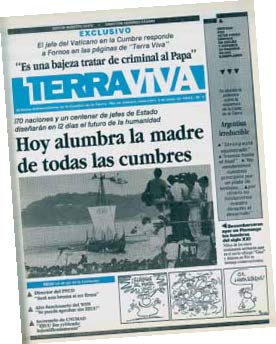Dear reader, twenty years after its first edition came out at the 1992 Earth Summit in Rio de Janeiro, TerraViva – a communication tool produced by the IPS news agency – is once again being published, this time to report on the different aspects of and challenges facing the United Nations Conference on Sustainable Development, better known as Rio+20.
Over these 20 years, we have produced many TerraViva special editions, at U.N. conferences as well as at major civil society gatherings.

"Our team of journalists, who have come from Africa, Asia, Europe, Latin America and North America, will provide you with reporting on different aspects of the debate."
To that end, we have mobilized hundreds of journalists from across the planet to produce highly professional, multicultural editions in various languages, which have made TerraViva a reference point for many political and other decision-makers.
That tradition could not be missing at this important meeting.
Although IPS has been closely following the preparations for Rio+20 for months, as part of our editorial policy that pays special attention to news about development, civil society and developing and emerging countries, as of June 13th we have been producing our daily on-line edition of TerraViva from the conference, and starting today, the print edition.
As our journalists have reported over the last months, the challenges are huge, especially the necessity of moving from the concept of sustainable development, which drew so much attention 20 years ago, to the need to fully integrate economic, social and environmental policy-making to stave off the much-predicted planetary collapse.
It is a question of understanding what it would mean if we failed to immediately adopt a number of measures, what the cost of these measures would be, and how they could be financed.
As the documents that are being discussed indicate, extreme poverty and inequality between rich and poor must be drastically reduced, and the effects of population growth must be fully understood, since global population is projected to reach nine billion by 2040, which will drastically increase demand for food, energy and drinking water.
Achieving inclusive growth, with sustainable production and consumption, would make it possible to deal differently with the problem of climate change and other threats to the planet.
In order to do that, new indicators must be established for monitoring and combating these problems.
Our team of journalists, who have come from Africa, Asia, Europe, Latin America and North America, will provide you with reporting on different aspects of the debate, the positions taken and declarations made, and the solutions proposed, so that communication will play its role in this great challenge for our planet. I am sure that you will appreciate this, just as you have our previous editions of TerraViva.
Happy reading!
Mario Lubetkin
IPS Director General








 Add to Google
Add to Google







